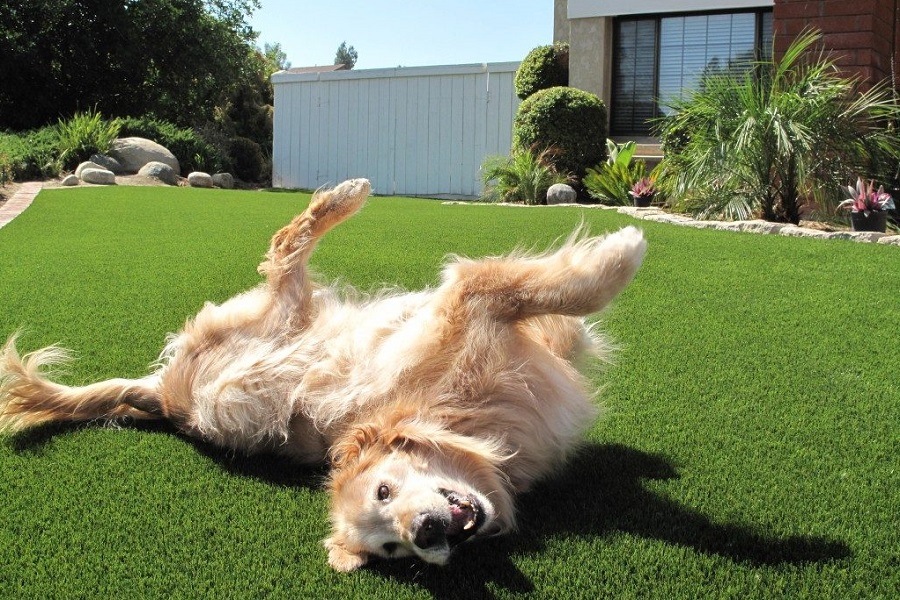How To Prevent Your Pets From Chewing Artificial Grass In National City?
 Artificial grass has become increasingly popular among pet owners for its low maintenance and durability. However, one common issue that pet owners encounter is their furry companions developing a penchant for chewing on the artificial turf. Not only can this habit damage your expensive investment, but it can also pose a risk to your pet’s health. Here are five effective tips to prevent your pets from chewing artificial grass.
Artificial grass has become increasingly popular among pet owners for its low maintenance and durability. However, one common issue that pet owners encounter is their furry companions developing a penchant for chewing on the artificial turf. Not only can this habit damage your expensive investment, but it can also pose a risk to your pet’s health. Here are five effective tips to prevent your pets from chewing artificial grass.
- Often, pets resort to destructive behaviors like chewing out of boredom or excess energy. Ensuring your pets receive enough physical exercise and mental stimulation can help curb their urge to chew on the artificial grass. Regular walks, interactive play sessions, and puzzle toys can keep them occupied and less likely to indulge in destructive behavior.
- Bitter sprays or deterrents designed specifically for pets can be effective in deterring them from chewing on artificial grass. These products have a bitter taste that pets find unpleasant, discouraging them from nibbling on the turf. Apply the spray according to the manufacturer’s instructions, focusing on areas where your pet tends to chew the most.
- Supervising your pets while they are in the yard can help prevent them from chewing on the artificial grass. If you catch them in the act, calmly redirect their attention to a more appropriate chew toy or activity. Consistency is key, and with time, they will learn what behavior is acceptable.
- Positive reinforcement training techniques can be highly effective in teaching pets what behaviors are acceptable. Whenever you observe your pet avoiding chewing on the artificial grass or engaging in alternative activities, such as playing with toys or lying on their bed, reward them with praise, treats, or affection. This positive association encourages them to repeat the desired behavior.
- Sometimes, chewing behavior in pets can be a symptom of underlying issues such as anxiety, teething, or dental problems. If you notice excessive chewing despite implementing preventive measures, it’s essential to address any potential underlying causes. Consult with your veterinarian to rule out any medical issues and explore appropriate treatment options.
FAQs
Is Artificial Grass Safe For Pets?
Yes, artificial grass is generally safe for pets. It is non-toxic and does not pose any significant health risks. However, ingestion of artificial grass fibers can cause gastrointestinal discomfort, so it’s essential to prevent pets from chewing on it.
How Do I Clean Artificial Grass After My Pet Has Been Chewing On It?
If your pet has been chewing on the artificial grass, you should clean the affected areas promptly. Remove any debris or loose fibers and then clean the area with a mild detergent and water solution. Rinse thoroughly to ensure all detergent residue is removed.
Can I Repair Artificial Grass That Has Been Damaged By Pet Chewing?
In some cases, minor damage to artificial grass caused by pet chewing can be repaired. You can purchase patch kits specifically designed for repairing artificial turf or consult with a professional installer for more extensive repairs.
Conclusion
Preventing pets from chewing on artificial grass requires a combination of proactive measures, including providing adequate exercise and stimulation, using deterrents, supervision, positive reinforcement training, and addressing any underlying issues. By implementing these tips and being consistent in your approach, you can protect your artificial turf investment and ensure the safety and well-being of your beloved pets. For more information, contact Artificial Grass National City at (619) 503-3536.

